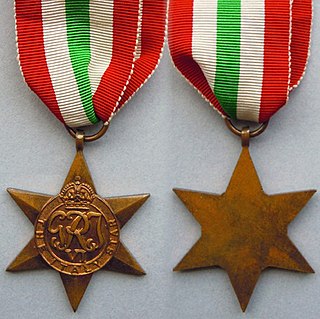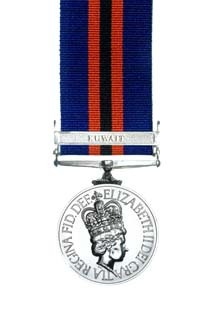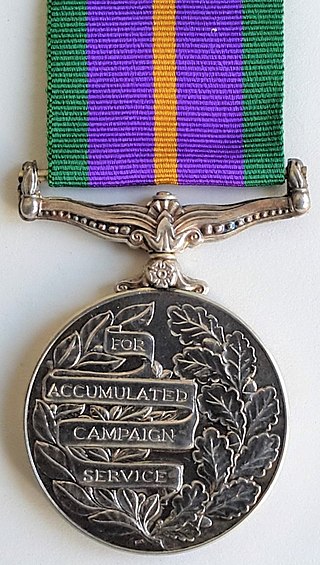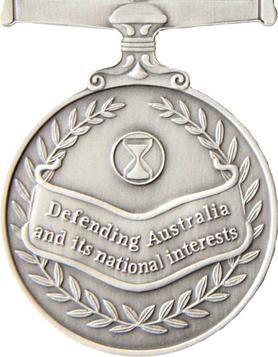The NATO Medal is an international military decoration which is awarded to various militaries of the world under the authority of the North Atlantic Treaty Organization (NATO). It is manufactured by Eekelers-Centini Intl, of Hemiksem, Belgium.

The Australian Active Service Medal (AASM) is an Australian military decoration. It was authorised on 13 September 1988 to recognise prescribed service in "warlike" operations, backdated to February 1975. It is awarded with a clasp to denote the prescribed operation and subsequent awards of the medal are made in the form of additional clasps. In 2012, it was announced that the medal would no longer be issued for future operations, with the AASM and the Australian Service Medal being replaced by the Australian Operational Service Medal.

The 1939–1945 Star is a military campaign medal instituted by the United Kingdom on 8 July 1943 for award to British and Commonwealth forces for service in the Second World War. Two clasps were instituted to be worn on the medal ribbon, Battle of Britain and Bomber Command.

The Italy Star is a military campaign medal, instituted by the United Kingdom in May 1945 for award to British Commonwealth forces who served in the Italian Campaign from 1943 to 1945, during the Second World War.

The Gulf War Medal was a campaign medal approved in 1992, for issue to officers and men of British forces who served in Kuwait and Saudi Arabia during Operation Granby in 1990–91.

The New Zealand General Service Medal 1992 (Warlike) (NZGSM 1992) is a New Zealand campaign medal, authorised in 1992, for award to New Zealanders who have served in warlike operations for which no separate New Zealand or British Commonwealth campaign medal was issued.

The Iraq Medal was authorised on 23 February 2004. It was a campaign medal issued to members of the British Armed Forces and certain attached personnel, who served between 20 January 2003 and 22 May 2011 on, or in support of, Operation Telic - the designation for British operations during the 2003 Invasion of Iraq and its aftermath.

The Operational Service Medal (OSM) is the overall name given to a group of campaign medals awarded by the British armed forces. Introduced in 1999 to replace the General Service Medal, the OSM features a common design for the medal itself, with each one differentiated by a distinct ribbon.

The Operational Service Medal for Sierra Leone is a campaign medal established in 2000 by the Ministry of Defence of the United Kingdom for participation in the British military intervention during and after the Sierra Leone Civil War, from May 2000 to July 2002.

The Operational Service Medal for Afghanistan is a campaign medal previously awarded by the Ministry of Defence of the United Kingdom for service by British Armed Forces personnel in support of the post-2001 Afghan War.

The Operational Service Medal for the Democratic Republic of the Congo is a British armed forces campaign medal, awarded mostly to military personnel who served between 14 June and 10 September 2003 on Operation Coral.

The General Service Medal, is a campaign medal of the United Kingdom introduced in 1962 to replace both the General Service Medal (1918), as awarded to the Army and RAF, and the Naval General Service Medal (1915). The 1962 GSM was awarded until 2007, when it was replaced by the Operational Service Medal. In 2015 the General Service Medal (2008) was introduced.

The Afghanistan Medal was instituted by Queen Elizabeth II, Queen of Australia on the advice of the Australian Prime Minister John Howard in 2004. It is awarded to Australian defence force personnel who served in or around Afghanistan after 11 October 2001. Defence force personnel are also recognised by the 'ICAT' clasp to the Australian Active Service Medal and the North Atlantic Treaty Organisation's Non-Article 5 Medal with 'ISAF' clasp.

The Australian Service Medal is an Australian military decoration. It was authorised 13 September 1988 to recognise prescribed service in peacekeeping and non-warlike operations. It is awarded with a clasp to denote the prescribed operation and subsequent awards of the medal are made in the form of additional clasps. The Australian Service Medal 1945–1975 recognises non-warlike service prior to February 1975. The Australian Service Medal was replaced in 2012 by the Australian Operational Service Medal, except for ongoing missions.

The Accumulated Campaign Service Medal and the Accumulated Campaign Service Medal 2011 are medals awarded by King Charles III to members of his Armed Forces to recognise long campaign service. The original Accumulated Campaign Service Medal, instituted in January 1994, was awarded to holders of the General Service Medal (1962) who had completed 36 months of accumulated campaign service. The replacement Accumulated Campaign Service Medal 2011 is now currently awarded to holders of various campaign service medals who have completed 720 days of campaign service.
The Special Service Medal is a service medal awarded to members of the Canadian Forces. The medal was established by letters patent by Queen Elizabeth II on 16 June 1984. Recipients of this medal must have performed, "service under exceptional circumstances". The medal is always issued with a bar which specifies the special service which the medal recognizes. Each bar has its own criteria.

The Australian Operational Service Medal is a campaign medal established on 22 May 2012 to recognise service by Australian Defence Force (ADF) personnel on designated hazardous operations. It may also be awarded to civilians who serve alongside the ADF on designated operations under specific conditions.
The Sainya Seva Medal is a medal of the Indian Armed Forces. The medal is awarded in recognition of non-operational service under conditions of hardship and severe climate in specified areas.
The International Operational Service Medal is a military decoration awarded by the Government of Ireland to personnel of the Irish Defence Forces who have been deployed on overseas missions by direction of the Government where no other mission medal has been awarded. It was first awarded in October 2016.
Tamgha-e-Diffa (Urdu: تمغہِ دفاع, lit. '' is a Pakistani general campaign medal and is awarded along with a clasp to all ranks who take part in minor operations or campaigns within a laid down period, dates and prescribed qualifying area.















